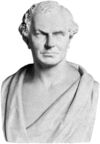Whewell, William — born May 24, 1794, Lancaster, Lancashire, Eng. died March 6, 1866, Cambridge, Cambridgeshire British philosopher and historian. He spent most of his career at the University of Cambridge, where he taught mineralogy (1828–32) and moral philosophy… … Universalium
Whewell, William — (1794–1866) English philosopher of science and polymath, of whom the essayist Sydney Smith (1771–1845) said ‘science is his forte, and omniscience is his foible’. Whewell was a lifelong Fellow of Trinity College, Cambridge. His philosophy of… … Philosophy dictionary
WHEWELL, WILLIAM — professor of the science of things in general, born at Lancaster, son of a joiner; studied at Trinity College, Cambridge, of which he became successively fellow, tutor, professor, and master; was a man of varied attainments, of great… … The Nuttall Encyclopaedia
Whewell, William — (1794 1866) Philosopher, theologian and mathematician, s. of a joiner at Lancaster, where he was b., ed. at Camb., where he had a brilliant career. He became Prof. of Mineralogy at Camb. 1828, of Moral Theology 1838, was Master of Trinity from … Short biographical dictionary of English literature
Whewell — Whewell, William … Philosophy dictionary
Whewell’s philosophy of science and ethics — Struan Jacobs ON SCIENCE Introduction Among the most prodigious of English minds of the nineteenth century, William Whewell (1794–1866) was at various times, and among other things, philosopher, intellectual historian, scientist, educationist,… … History of philosophy
Whewell — William Whewell William Whewell (* 24. Mai 1794 in Lancaster, England; † 6. März 1866 in Cambridge, England) war ein britischer Philosoph und Wissenschaftshistoriker. Whewell war 1818 Präsident der Cambridge Union Society. Ab 1817 war er Fellow… … Deutsch Wikipedia
William Whewell — William Whewell. William Whewell (24 de mayo de 1794 6 de marzo de 1866). Teólogo, filósofo y científico británico. Y al mismo tiempo conocido por emplear el término científico en vez de filósofo natural … Wikipedia Español
William Whewell — (* 24. Mai 1794 in Lancaster, England; † 6. März 1866 in Cambridge, England, Aussprache ˈhjuːəl) war ein britischer Philosoph u … Deutsch Wikipedia
William Whewell — (phon. ˈhjuːəl) est un polymathe anglais, scientifique, philosophe et historien des sciences, né à Lancastre le 24 mai 1794 et mort à Cambridge le 6 mars 1866. En 1821, il dev … Wikipédia en Français
 William Whewell, busto de Edward Hodges Baily, 1851; National Portrait Gallery, Londres.By courtesy of the National Portrait Gallery, London
William Whewell, busto de Edward Hodges Baily, 1851; National Portrait Gallery, Londres.By courtesy of the National Portrait Gallery, London